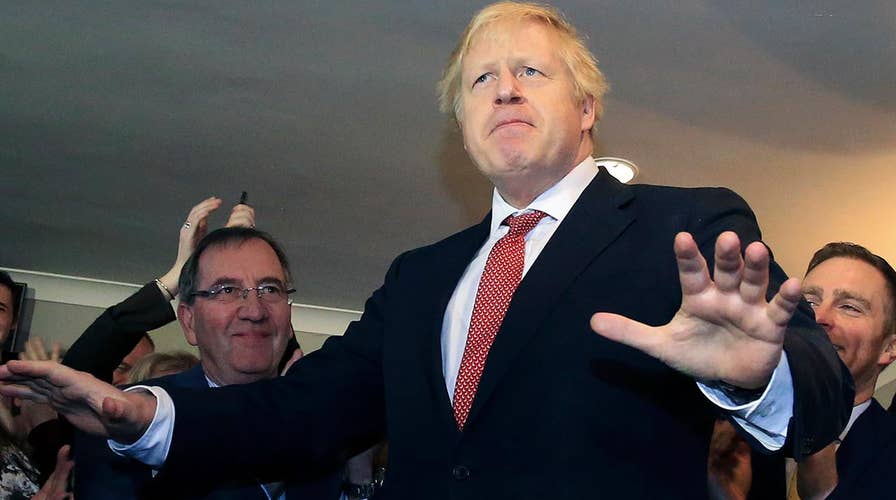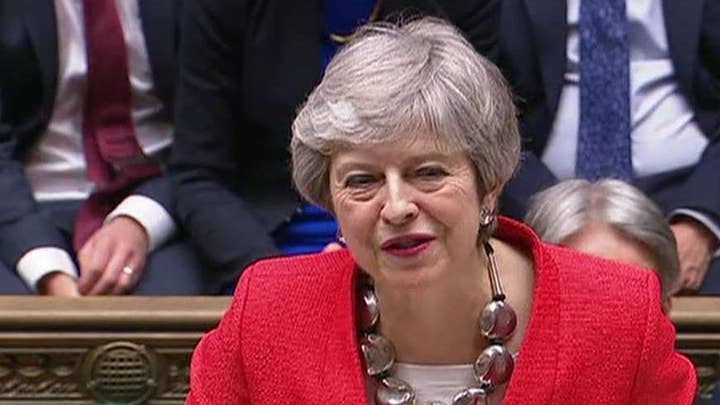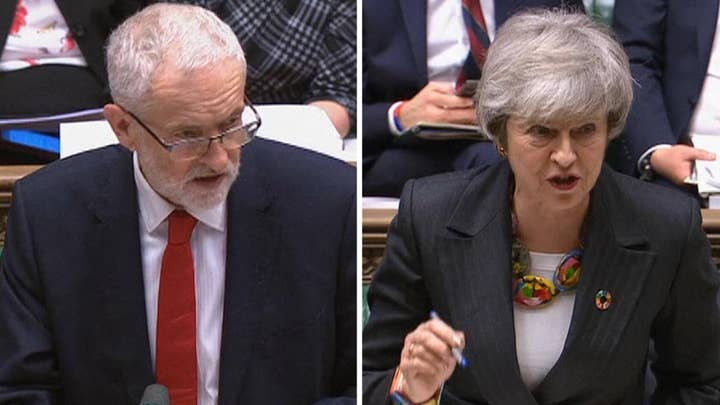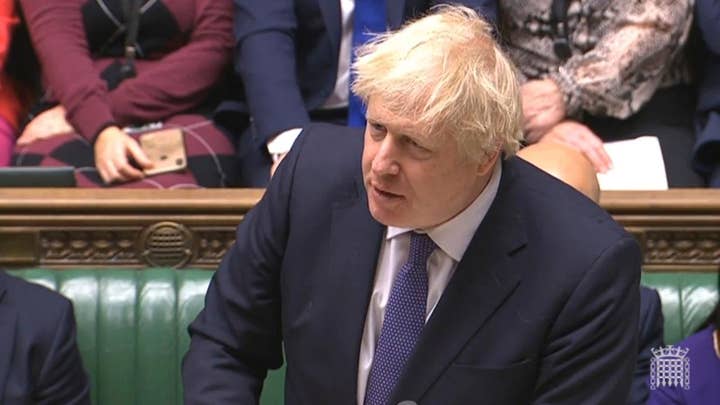Is UK election result a warning for Democratic presidential candidates?
Insight from Nile Gardiner, former adviser to Margaret Thatcher.
It was another dramatic year in British politics in 2019, roiled by even more back-and-forth deliberations over Brexit and one that saw two major shifts in both a new prime minister and a general election in December, radically changing the House of Commons.
The main item of the year was Brexit, which has dominated the British political debate since voters chose to leave the European Union in 2016.
THERESA MAY'S ALLIES KEEP HER IN POWER BY WARNING OF HARD-LEFT TAKEOVER IF SHE FALLS
Former Prime Minister Theresa May had spent much of 2018 thrashing out a withdrawal agreement with E.U. leaders, only for it to stall in Parliament in 2019. With a slim majority, and furious pro-Brexit members of her own party objecting to parts of the deal, it was rejected by the House three times. She also survived votes of no confidence in her leadership over her Brexit handling.
The key issue was the backstop — a mechanism designed to stop a hard border between Ireland and Northern Ireland. While intended as a safety net in which the U.K. would remain in a customs union until a trade deal was secured, Brexiteers pointed to the lack of a unilateral exit mechanism as evidence that it could lead to Britain never leaving at all.
May attempted to secure concessions on the deal from E.U. leaders but Parliament wouldn’t budge, putting increasing political pressure on her to resign — calls that had started after her majority had been slashed in the 2017 election. It led to multiple delays from the original departure date from March until October.
That pressure built further when Brits voted in the European Parliament election in May. That election saw May’s Conservative Party come fifth, with Nigel Farage’s Brexit Party coming first. Before the results were fully in, May announced her intention to resign.
"I believe it was right to persevere even when the odds against success seemed high. But it is now clear to me that it is in the best interests of the country for a new prime minister to lead that effort," she said outside 10 Downing Street.
UK PM THERESA MAY ANNOUNCES RESIGNATION AMID FURY OVER BREXIT HANDLING
As she stepped down and the Tories began a search for a new leader, anti-Brexit “Remain” MPs began to smell blood and became more outspoken for either a second Brexit referendum or ditching Brexit altogether — with the Liberal Democrats adopting the slogan: “Bollocks to Brexit.”
Meanwhile, the Labour Party struggled to adopt a clear Brexit position. While the party was filled with passionate "Remainers," both in its base and in Parliament, leader Jeremy Corbyn was a life-long Eurosceptic — and the party’s manifesto had promised to deliver on leaving the E.U.
When Corbyn eventually came out in favor of a second referendum, it put them in the soup with voters in Labour heartlands that had voted heavily for Brexit -- something that would punish Labour later in the year.
The Tories were boosted by a relatively short and bloodless leadership race that saw front-runner Boris Johnson take over in Downing Street and promise to pull Britain out of the E.U. on the then-deadline of Oct. 31.
But as Johnson, who had campaigned for Brexit in 2016, took a stronger stance on Britain's divorce and left the door open to leaving without a withdrawal agreement, he too struggled to keep his party in line. Pro-Remain Tory MPs defected from the party, whittling down his already razor-thin majority to zero.
The result was parliamentary paralysis. Lawmakers voted to bind the hands of the government so it couldn’t leave without a deal and also refused to vote for Johnson’s own withdrawal agreement — which included the removal of the controversial backstop.
Johnson called for a new general election to break the stalemate, but opposition lawmakers refused to vote for a no-confidence motion in Parliament until after the Oct. 31 deadline had passed.
Labour and pro-Remain lawmakers said they wanted to be sure no-deal was off the table, while Tories accused the opposition of being scared that an election would hand Johnson a majority.
Tensions boiled over in a furious speech by Tory and Attorney General Geoffrey Cox in September, who branded the parliament “a disgrace” and a “dead parliament” that should be dissolved.
“They could vote no confidence at any time, but they’re too cowardly to have a go,” he bellowed to cheers from the Tory backbenches and angry yells from the opposition. “But the time is coming....when even these turkeys won’t be able to prevent Christmas.”
Johnson’s government tried again in a rare Saturday session of Parliament in October to get his new deal through, but it was derailed by anti-Brexit MPs just hours before they were due to cast their votes — after they passed an amendment that would require the prime minister to apply for a delay.
Johnson was eventually required to request a delay until Jan. 31, which was accepted by E.U. leaders, in a major defeat for the new PM. It was at that point when Corbyn backed a general election call — setting the scene for a December election.
JOHNSON'S CONSERVATIVES PICK UP MASSIVE MAJORITY, WREAK HAVOC IN LABOUR HEARTLANDS
Polls from the outset showed Johnson’s Tories comfortably ahead, but as the race continued they narrowed. Mixed with fresh memories of the 2017 election – where polls had put May’s Tories lengths ahead, only for the vote to produce a hung parliament – no-one was really sure what the outcome would be.
Hours before the election results began to come in, there were rumors from Labour activists on the ground that Johnson could even lose his seat as Tory activists warned of the dangers of a Corbyn-led government.
But at 10 p.m. local time on Dec. 12, the broadcaster’s exit poll dropped, predicting that the Tories would win an overwhelming majority of approximately 80 seats — well ahead of what even the most optimistic of Conservative activists had hoped.
As the results came in, it became clear that the Tories had made enormous inroads in pro-Brexit Labour heartlands in places such as Burnley, Redcar, Stoke-on-Trent and Wrexham. It handed Johnson a comfortable majority, and more than enough seats to pass his withdrawal agreement — as well as much of his non-Brexit agenda on issues such as healthcare, immigration and infrastructure.
Corbyn, meanwhile, announced he intends to step down as Labour leader after the party goes through what he described as a “period of reflection.” Whether Labour will pivot to the center, or stay a far-left party will presumably be decided then.
CLICK HERE FOR THE FOX NEWS APP
A week after the election, the withdrawal agreement passed comfortably through Parliament — which includes a limit of the end of 2020 for how long a post-Brexit transition period can last.
It means that, barring any further surprises, Britain will leave the E.U. on Jan. 31, 2020 and wrap up a post-trade deal by the end of the year.
It means the battle for Brexit is over. But the debate about what happens after Brexit has just started.











































